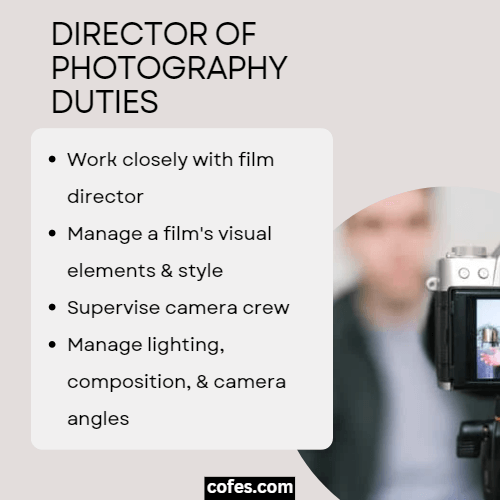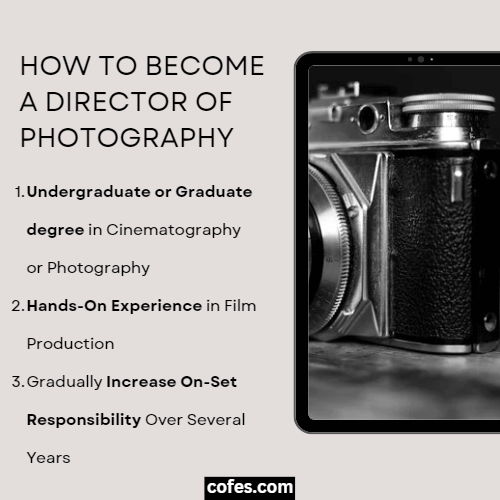Interested in a career within the film industry?
Becoming a director of photography may be a natural fit for you.
Here, we will explain everything you need to know about the job: requirements, responsibilities, and necessary skills.
The director of photography position works hand-in-hand with a film director.
They are the star of figuring out a film’s visual elements and style through the development of style, lighting, composition, and camera angles.
In collaboration with the director, the director of photography is crucial to the film’s stylistic narrative.
Director of Photography Job Information
| Official Job Title | Director of Photography |
| Average Salary | $75,000 |
| Stress Level | Average-High |
| Work/ Life | Low-High |
| Job Satisfaction | High |
| Career Advancement | Average |
Director of Photography Job Description
What is a Director of Photography?
The director of photography position works hand-in-hand with a film director.
They are the star of figuring out a film’s visual elements and style through the development of style, lighting, composition, and camera angles.
In collaboration with the director, the director of photography is crucial to the film’s stylistic narrative.
They oversee a portion of a film crew and can be the go-to person to resolve conflicts due to being a supervisory role.
What does a Director of Photography do on a Daily Basis?
On a day-to-day basis, the director of photography controls every aspect of what the camera captures.
These components include composition, exposure, lighting, filters, and camera movements.
They are the supervisor of a film set’s camera and lighting crews.
They also choose all cameras, lenses, and other technical devices needed to film throughout the shoot.

Responsibilities, Duties & Roles of a Director of Photography
Some of the duties and responsibilities of a Director of Photography are scouting locations, gathering equipment, assembling lighting and camera crews, and operating cameras.
These activities happen when a film is in pre-production.
When the shoot is actively in production, the director of photography blocks shots, shoots scenes, decides on framing and exposure, utilizes different lenses and filters, decides all camera movements, and reviews the daily raw footage.
The director of photography reviews the dailies in collaboration with the director to ensure their views are aligned.
Once filming completes, the director of photography’s job begins to close.
Their final task is to tweak and finalize the color grade, or color palette, applied across the film.
Director of Photography Salary
Average Salary
The average salary for directors of photography is approximately $75,000.
Entry Level Salary
The lowest reported salary for entry-level directors of photography falls at $39,000 per year. That said, Zippia reports entry-level salaries as $64,000 on average.
Senior Salary
A senior-level salary for directors of photography can be wide-ranging due to notoriety and professional experience.
However, Glassdoor’s reported average senior wage to be approximately 105,000 dollars per year.
How to Become a Director of Photography
The Entry Level: Certification, Training & Degree
Aspiring directors of photography typically begin their careers as second-camera assistants on shorter commercials and films.
Most candidates attend film or trade school to specialize in the film industry’s required skills to obtain this entry-level position.
Typically, a four-year bachelor’s degree is not required, allowing those interested in a film career to receive a one or two-year degree.
This decreased time is exciting for most because it will enable candidates to work faster than other jobs in differing industries.
Additionally, while in training, it is common for individuals to work on student films, which will bolster their resume and job prospects upon graduation.
Other Skill Sets, Requirements & Qualifications
Every aspiring cinematographer needs a few essential things: artistic vision, an eye for photography, the ability to lead, technical skills, a developed portfolio, and work experience.
The director of photography is a role that requires an equally balanced skillset in creativity and technical knowledge.
Managing a large team is a part of their responsibilities, making leadership capabilities of utmost importance.
How Long Does It Take To Become a Director of Photography?
To be straightforward, it may take several years to become a proficient and sought-after director of photography.
Working the way up the ladder and garnering additional experience is essential to obtaining a career in this role.
Working diligently throughout every opportunity given proves work ethic to the network of individuals that can drop your name when someone is looking for that next significant role to fill.
It is challenging to put an exact amount of years on the career path to landing a well-paid director of photography position.
But if you follow your passion and dedicate yourself to your work, it will inevitably happen.
Is it Hard to Become a Director of Photography?
As we’ve discussed, building a solid portfolio can take time and dedication.
While it is not impossible to land a secure role as a director of photography, those aspiring for a consistent cinematography career must be highly committed to climbing the ladder and building the necessary skill set to prove their preparedness for the job’s responsibilities.
Most people drawn to the film industry find themselves there because of an overwhelming passion for the field.
If you rely on that passion, you are sure to find success.

Director of Photography Career Paths
The Director of Photography Roadmap
If you haven’t noticed by now, the road to becoming a photography director is like climbing a ladder.
Aspiring cinematographers gain educational experience, typically through trade schools or film schools.
While in training, working on student projects will boost your resume when you apply for your first paid position.
A typical entry-level job is a second camera assistant. From there, you can move up to the first camera.
After mastering all the skills for those positions, you can continue to become a camera operator.
These experiences will make candidates well-positioned to apply for a director of a photography role.
Projections for Growth in Director of Photography Jobs
Careers in film, especially for directors of photography, have positive outlooks over the next decade.
The current projected growth for this position is 8%.
With the boom in streaming services, more film content is in production than ever before.
In an industry known as challenging, these high projections are certainly something to celebrate.
In Summary: Is Director of Photography a Good Career?
Overall, a career as a director of photography is enriching for individuals passionate about the film industry.
Having an artistic vision, technical skills, and managerial skills is a well-regarded combination for an enjoyable career.
However, there are many reports of difficult work-life balance and stories of intense stress.
A contributor to a report published by Careers in Film, the creatively nomadic lifestyle is wonderful.
But that lifestyle makes it challenging to build a family and insert boundaries that promote work-life balance and sustained mental health.
One must have a deep-seated dedication to the job’s requirements and welcome the unexpected to enjoy this career long-term.
Director of Photography Working Conditions
Can a Director of Photography Work Remotely From Home?
Working from home in this role is close to impossible.
Directors of Photography must be on location to shoot and oversee film crews throughout the production process.
That said, one could do some pre- and post-production duties from home.
But we say one should always expect to be on-site.
How Many Hours Does a Director of Photography Work?
The lifestyle of a director of photography comes with intense work environments and long hours.
Do not strive for this career if you are interested in a standard 9-5 position.
Can a Director of Photography Work Part-Time?
If you come across a part-time position for a director of photography, consider yourself lucky.
As we’ve discussed, this role comes with long and unpredictable hours.
Just like one should not strive for this career if they’re interested in a standard 9-5, one should not seek out this opportunity if they are only available part-time.
What are the Average Vacation Days of a Director of Photography?
In short, vacation days are unpredictable or not offered at all.
First-hand accounts describe time off as non-existent when actively working on a film.
There are times in between film gigs when you will be out of work, but that comes with its own stress.
However, if you have multiple projects lined up, using the time in between to rest and rejuvenate can benefit your overall health and sustainability in your career.
Alternative Careers & Similar Jobs to a Director of Photography
- Film Editor
- Film Producer
- Multimedia Artist
- Sound Engineer
- Camera Operator
- Screenwriter
- Content Creator
- Web Designer
- Communications Director
Director of Photography Resume Tips
Four key tips for creating a resume for this position are highlighting relevant experience, showing applicable skills, quantifying your achievements, and ensuring precise formatting from top to bottom.
A top priority of employers in the film industry is to seek out employees with previous hands-on experience.
Be sure to include all work that proves your field expertise.
Also, include all of the following basics:
- Name, contact information, LinkedIn profile, education, experience, certifications, and additional skills.
Director of Photography Interview Questions
Below are a few potential interview questions that recruiters may ask the director of photography candidates.
We also define the purpose of the question to help you prepare for your first interview.
Q1: What is it like working on your own?
Why it works: Asking this question during an interview can examine personalities to determine if the candidate embodies optimism and high expectations.
Q2: What type of people do you work with most effectively?
Why it works: In opposition to the previous question, this question examines an individual’s ability to collaborate with others and in what capacity. Directors of Photography lead large teams, so they must be able to work with others effectively.
Q3: What experience do you have working with camera equipment?
Why it works: Asking this question allows candidates to express the working knowledge necessary for the job. When listening to someone’s answer or brainstorming your answer, keep an ear out for the use of proper technical terms and industry jargon. Using adequate terminology can show candidates have the skills they claim.
Jobs Related to Director of Photography
- First Camera Assistant
- Second Camera Assistant
- Camera Operator
- Steady Cam Operator
- Director
- Production Assistants
- Producer
- Gaffer
